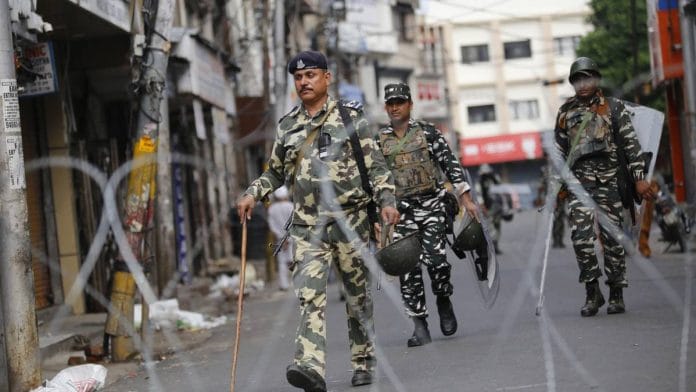Srinagar: The restrictions imposed on the movement of civilians in Jammu and Kashmir, in the wake of Narendra Modi government announcing its decision to do away with Article 370, will become more stringent over the next three days owing to Friday jummah prayers and Eid on 12-13 August.
Senior government officials in the Valley said people are expected to gather in large numbers for the weekly Friday prayers for the first time since the restrictions were imposed under Section 144.
The restrictions since Sunday night have brought the Valley to a standstill.
Mobile, landline, internet and even local cable TV networks have been blocked. Authorities are said to be communicating with each other through around 300 satellite phones provided to them by the central government.
Sources said though the government plans to have a more lenient approach towards traffic movements after Saturday, telephone and mobile phone networks are likely to remain shut until 15 August, the Independence Day.
Depending on the prevailing situation in the region, landline connections may be restored on Eid, the sources added.
Also read: Forcing New Delhi’s will on Kashmir will only intensify the grievances of its people
‘Friday prayers will have to be taken care of’
Jammu and Kashmir has been under a massive security crackdown since Sunday night, hours before Union Home Minister Amit Shah addressed Parliament Monday announcing the government’s decision to withdraw the special powers accorded to Jammu and Kashmir under Article 370.
Shah also conveyed the government’s decision to bifurcate the state into two union territories of Jammu and Kashmir and Ladakh, with and without a legislature, respectively.
In anticipation of widespread violence after the big decisions, there has been a clampdown on communication networks and civilian movements.
A senior government official said there was a plan to relax the restrictions by Friday, but the local police raised concerns that situation might get tense on that day.
“The Friday prayers will have to be taken care of delicately, and we have been trying to ensure that law and order is maintained,” said the official, adding that the developments Friday will ascertain how the security situations — whether to relax the restrictions or further tighten them — are going to be in the coming days.
Landline connections might be restored only if the situation till 12 August remains under control, said the official.
Security forces asked to show restraint
Meanwhile, journalists in the Valley were issued passes Wednesday to move past the restrictions after they raised concerns over not being able to send dispatches to their respective publications.
The passes will be valid for three days. While television journalists were able to report through satellite communications, those working for print and online publications have been unable to work since Sunday.
National Security Adviser Ajit Doval, who is currently visiting J&K, and Shah are learnt to have given specific instructions to the security forces to maintain restraint when faced with violent clashes.
“The view is that civilian killings can only initiate a cycle of violence, which will be difficult to control. Forces are showing great restraint,” said a senior government official.
However, incidents of stone-pelting have been reported from several parts in the Valley since Monday.
More than eight people have been admitted so far to Shri Maharaja Hari Singh Hospital in Srinagar with pellet injuries. The body of a youth, who drowned in a river in Palpora area on the outskirts of Srinagar, was brought to the hospital Monday.
Also read: By scrapping Article 370, Modi is going for a failed European model of nation building







India’s very own Gaza situation created 5th August 2019.. As the saying goes… “Haste is of the Devil”.